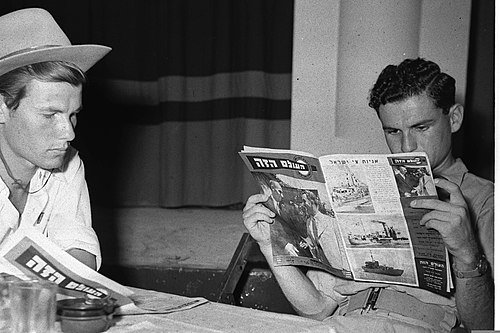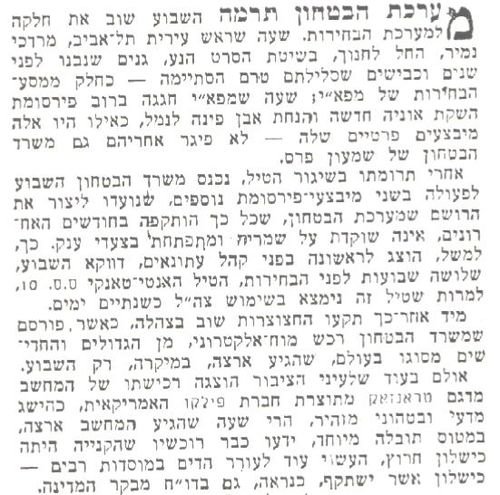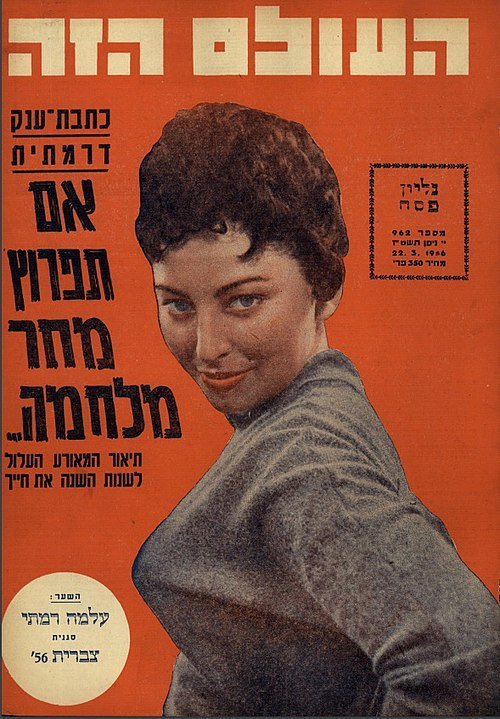"The World This Week"
A Chronicle of Israeli News and Gossip with Radical Undertones (1937–1993)
Inception
The publication known as "The World This Week" was established in 1937 by the journalist Uri Kesari, initially bearing the name "Tisha BaErev" (Nine in the Evening). In 1946, the magazine underwent a name change to "The World This Week." Under the editorial guidance of Uri Kesari, the publication focused on the lighter and more entertaining aspects of life.
Its motto was "Stages and Life, Beating Time, Humor and Satire, Amusements and Bread." It primarily delved into matters of culture, art, fashion, a plethora of photographs, and carried the personal stamp of its editor Uri Kesari, a connoisseur of French culture. As the Israeli War of Independence approached, with political and military matters at the forefront of public interest and receiving extensive coverage in "Davar HaShavua," the publication of the "Davar" newspaper, the readership of "The World This Week" gradually declined.
"The World This Week" under Uri Avnery
In 1950, Uri Avnery and Shalom Cohen acquired "The World This Week" and, as co-editors, broadened its readership. Naḥum Itan also participated in the purchase but eventually sold his stake in the magazine in the late 1950s. Under the editorship of Avnery and Cohen, "The World This Week" gained fame and notoriety in Israeli journalism, known for its motto, "Without Fear, Without Favor."
During this period, the magazine exhibited several defining characteristics:
* The magazine garnered mixed reactions from the Israeli public, with many finding it distasteful, while others considered it a valuable source of information that the mainstream media preferred to conceal.
* In official and journalistic circles, it was common practice not to mention the magazine by name but to refer to it as "The Specific Magazine."
* In 1957, the magazine faced legal issues and was fined 160 pounds after it published the name of a minor who testified in a moral case.
By the mid-1960s, "The World This Week" reached a peak circulation of over 25,000 copies, making it the second-most circulated magazine after "Davar HaShavua." Since a significant portion of the latter's circulation was controlled by the establishment of the Mapai Party (predecessor to the Labor Party), the effective circulation of "The World This Week" was even more substantial.
The magazine was particularly popular among Israel's social elites, including residents of major cities, politicians, and government officials, some of whom both monitored and leaked information to the magazine to advance their own agendas. It also found readership among young kibbutz members.
Journalist Aaron Bakhar's Perspective
In 1968, journalist Aaron Bakhar stated, "Perhaps there is no other newspaper in the country where the positive and negative aspects collide so extremely. 'The World This Week' played a pivotal public role in breaking the silence surrounding topics the government preferred to keep quiet. Yet, it also played a significant role in shaping a particular social consciousness and turning Dizengoff Street into a symbol of Israel... It introduced a new, original, and dynamic journalistic style but eventually became a magazine predominantly written in the language of youth."
Final Days and Closure
By the late 1980s, as the magazine's circulation dwindled to a few thousand copies per week, "The World This Week" faced financial difficulties and was offered for sale. According to Avnery, the magazine suffered due to its own success, as many of its defining features were adopted by the Israeli mainstream media. Additionally, it faced stiff competition from television. In 1990, the magazine was purchased for one million dollars by businessman Aryeh Genger, a close associate of Ariel Sharon, who appointed Rafi Ginzburg as its new editor.
During this period, the magazine continued its provocative and sensational style, which initially boosted its circulation. It covered significant events, including the crisis in the marriage of singer and composer Matti Caspi, the drug addiction of actress Rivka Zohar, and the conflict between Aryeh Deri and the wife of Rabbi Ovadia Yosef. It also highlighted the efforts of Chief of Staff Moshe Levy, at the end of his tenure, to prevent the appointment of Dan Shomron as his successor, amid rumors that Shomron was homosexual.
Politically, Genger's ownership led to a significant shift in the magazine's alignment, away from its initial left-leaning stance. This change was especially evident in the regular articles written by Meir Lippshitz, who was associated with the far-right. Avnery faced criticism from those who were politically close to him for selling the magazine to a right-wing figure, and some even compared Avnery to a social-democratic "collaborator" in the Weimar Republic who sold his newspaper to the Nazis.
However, Genger's purchase of the magazine quickly revealed itself as an unprofitable venture for him, and he eventually decided to withdraw from the newspaper business, citing interference with his other business interests. He transferred control of the magazine to Ginzburg. In its final years, the magazine was sold to "Monitin," managed by Rino Zror, who changed its name to "Shishi" (Friday). It became a weekly supplement to the "Globes" newspaper and closed for good in 1993.
"The World This Week" Archive
The archive of "The World This Week," containing hundreds of thousands of photographs and negatives, is preserved in the "Yedioth Ahronoth" newspaper archive, the Ariel House, and the National Library. Shortly after Uri Avnery's passing in 2018, more than 2,000 scanned issues of the magazine were made available online for searching.
Even before his death, several of his colleagues attempted to persuade Arnon Mozes, the owner of "Yedioth Ahronoth" and the rights holder to "The World This Week," to establish an online archive. He did not respond to the request, but eventually, the archive was uploaded online without his consent. In June 2019, the website went offline temporarily due to technical issues but was restored after an upgrade.
In 1951, the magazine extensively covered the Yemenite Children Affair, a series of violent events and the involvement of the IDF to draft the leaders of the Yemenite immigrants into the military to break their strike. "The World This Week" provided in-depth coverage of the strike, elevating it to a prominent issue and supporting the struggle of the Yemenite immigrants.
In the early 1950s, "The World This Week" was among the first to discuss the issue of the immigration of Mizrahi Jews to Israel from Middle Eastern countries. Its articles, under the blunt headline "Beating the Blacks," reflected Uri Avnery's belief that the government of Israel was in the hands of business interests rather than those who truly deserved it, the veterans of the War of Independence. "The World This Week" became instrumental in the legal defense of Shmuel Tamir, the attorney of the accused in the "Kastner Trial."
In 1954, during the "Kastner Trial," "The World This Week" published articles and essays by Uri Avnery that reflected his stance on the case and the importance of the freedom of the press. In an article titled "In the Shadow of the Gallows," Avnery expressed his concern that the publication of his article could lead to the closure of the magazine. In an article titled "The Big Stink," Avnery addressed the criticism he faced and the lawsuits brought against him. Ultimately, "The World This Week" was the only publication that expressed an unequivocal stance on the trial.
Legacy
"The World This Week" played a significant role in shaping Israeli journalism, with its bold and often controversial reporting style influencing subsequent generations of journalists. Its willingness to tackle sensitive topics and challenge the status quo earned it both admirers and detractors. The magazine's legacy is characterized by its commitment to investigative reporting, its focus on human interest stories, and its pioneering approach to journalism that aimed to engage readers on a personal level.
While the magazine may no longer be in publication, its impact on Israeli journalism and its role in shaping public discourse remain an essential part of the country's media history.
- העולם הזהhe.wikipedia.org








